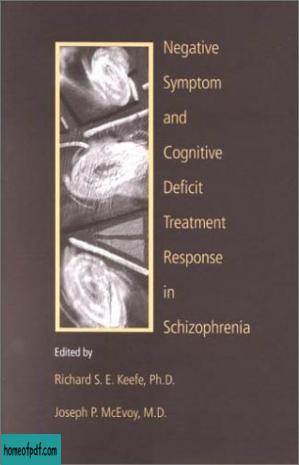Negative Symptom and Cognitive Deficit Treatment Response in Schizophrenia 电子书下载
For the first time in a single volume, distinguished experts address the complex issues—issues rarely confronted in empirical studies of patients with schizophrenia—and controversial research surrounding the assessment of negative symptoms and cognitive deficits in patients with schizophrenia. Despite recent advances in our understanding of schizophrenia, still notably absent is consensus in assessing negative symptom treatment response. What is the most effective assessment method—given the varying methodologies and contradictory results to date? What constitutes an adequate response? Which medication—none is specifically indicated and licensed for negative symptom treatment—yields the best results? What are the indications for use of this medication? Which instrument best measures negative symptom treatment response (eight rating scales are analyzed here)? Reaching consensus among clinicians and researchers alike is even more difficult because assessment is often thwarted by extrapyramidal side effects of medications, similarities to depressive symptoms, and secondary effects of psychotic experiences. In addition to clarifying these pressing issues, Negative Symptom and Cognitive Deficit Treatment Response in Schizophrenia also discusses The importance of measuring the experience of emotion versus the more traditional objectively measured symptoms in patients with schizophrenia, and how deficits in emotional experience may resist treatment—even in treatment-responsive patients. The family as an often overlooked source of information about negative symptom improvement or worsening, and the impact of negative symptoms on patients` relatives. How treatment affects social functioning and subjective experience of ``quality of life,`` and the importance of neurocognitive dysfunction in the social deficits of schizophrenia, which often persist despite significant amelioration of other symptoms. Specific guidelines for assessing neurocognitive treatment response. Cognitive enhancement is a major factor in improving the quality of patients` lives. The latest research on the neurobiology of negative symptoms, including the role of various neurotransmitter systems and brain regions in mediating negative symptom pathology. Also discussed is single vs. multiple pathophysiological processes and single treatment modality vs. distinct treatments for different aspects of negative symptoms. How to distinguish ``pure`` negative symptoms from deficit symptoms (i.e., those that persist for at least 1 year and are not secondary to factors such as depression, medication side effects, anxiety, delusions, and hallucinations), and which treatment is indicated for each. Highlighted by patient vignettes, this in-depth guide will be welcomed by all clinicians who treat patients with schizophrenia and want to know and document whether their interventions ameliorate negative symptoms and cognitive dysfunction, and by all researchers who study schizophrenia, particularly those interested in clinical issues and treatment studies.
尊敬的读者:
欢迎您访问我们的网站。本站的初衷是为大家提供一个共享学习资料、交换知识的平台。每位用户都可以将文件上传至网盘并分享。
然而,随着用户上传的资料增多,我们发现部分不宜或版权问题的书籍被分享到了本站。
为此,我们已经关闭了分享入口,并进行了多次书籍审查,但仍有部分内容未能彻底审查到位。
在此,我们恳请广大读者与我们共同监督,如发现任何不宜内容,请 点击此处 进行举报,我们会第一时间处理并下架相关内容。
希望我们能共建一个文明社区!感谢您的理解与支持!
猜你喜欢
- 《脑与数学》斯坦尼斯拉斯超值白金版 电子书下载
- Mastering Emacs - Mickey Petersen 电子书下载
- 《医治受伤的自信》弗雷德里克•方热 电子书下载
- 《完美的防范:法律风险管理中的识别、评估与解决方案》吴江水升级版 电子书下载
- 《我的职业是小说家》村上春树中文修订版 电子书下载
- 《望江南》王旭烽超值白金版 电子书下载
- 《机器人大师》斯塔尼斯瓦夫·莱姆 电子书下载
- 《今天也很喜欢你》罗曼茶茶经典言情中文原版 电子书下载
- 《单身力》小野 电子书下载
- 《办公软件高级应用:Office 2010》吴卿文字版 电子书下载
- 《论语译注 (国学经典译注)》金良年经典版 电子书下载
- [英文][经济学人]The_Economist_-_2018-12-15 电子书下载












